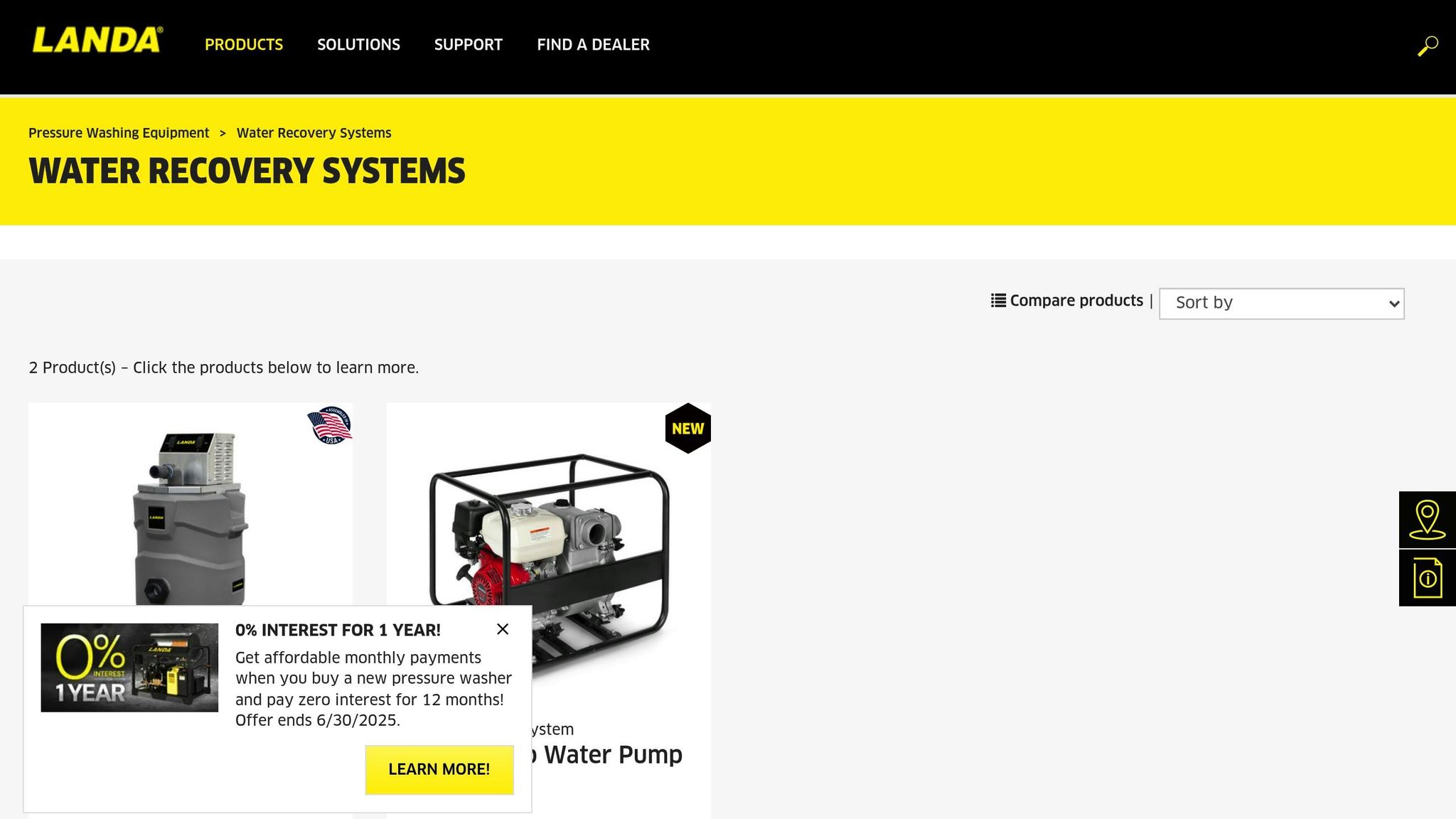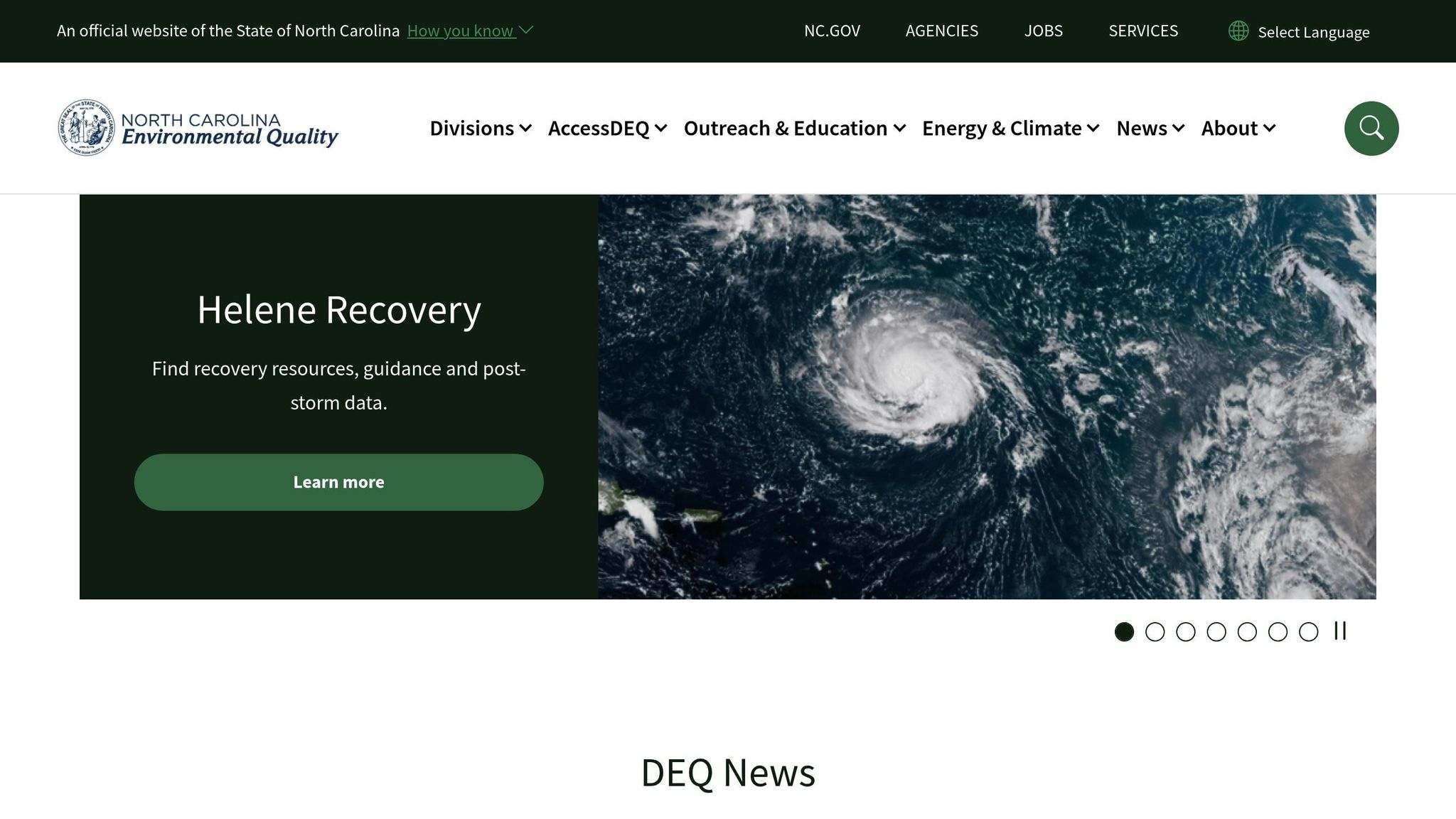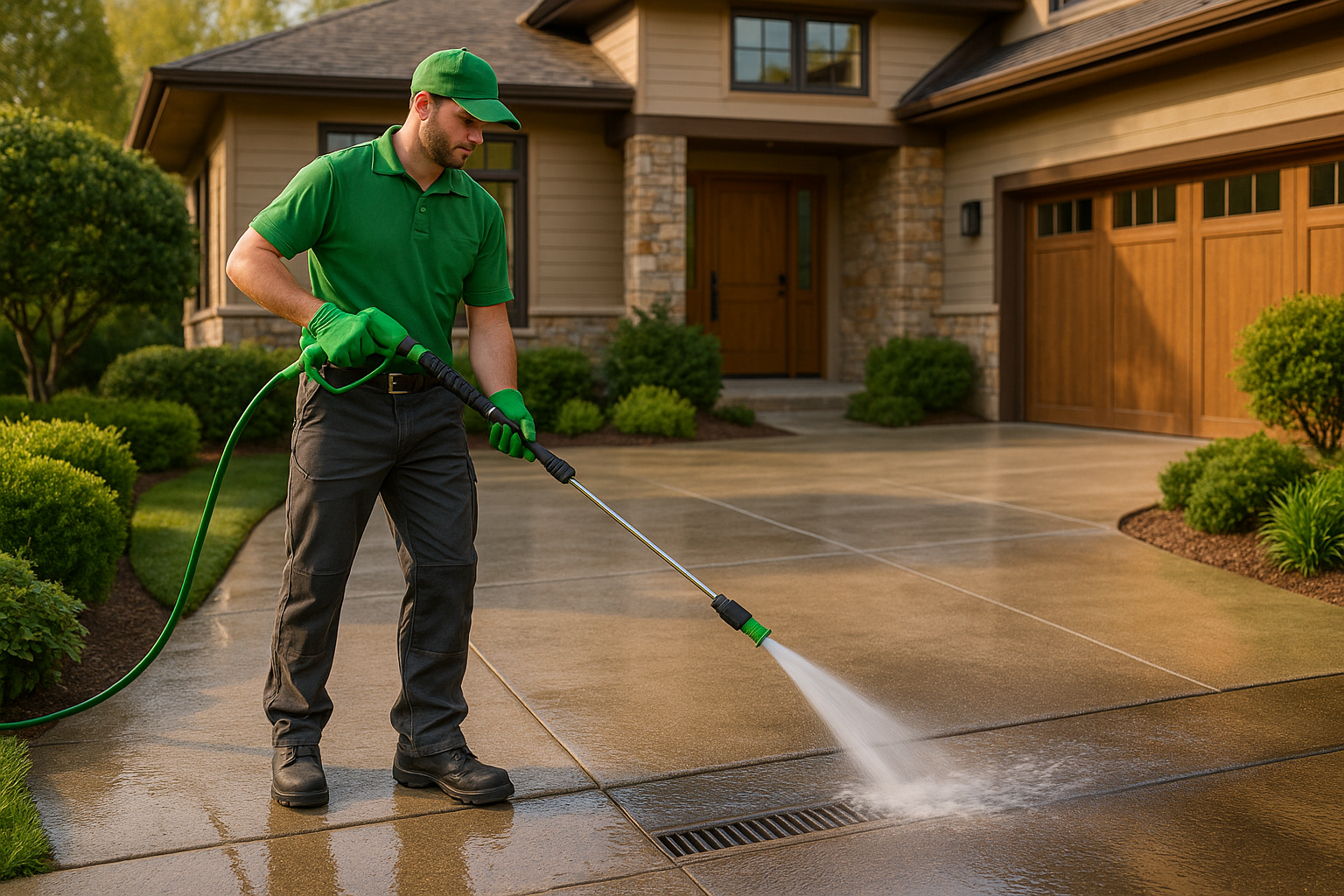Starting in 2025, Cary, NC prohibits untreated pressure washing wastewater from entering storm drains or waterways. This wastewater often contains harmful chemicals, oils, and debris that can damage aquatic ecosystems. Both businesses and homeowners must comply with strict wastewater disposal rules to avoid fines and protect the environment.
Key Takeaways:
- Don't discharge wastewater into storm drains. Use approved containment and disposal methods instead.
- Legal disposal options include:
- Municipal sanitary sewer (requires pre-treatment and approval).
- Licensed waste haulers for transport to treatment facilities.
- Closed-loop recycling systems (no discharge permit needed).
- Equipment to use: Vacuum recovery systems, containment berms, storm drain covers, and filtration systems.
Violations lead to fines, environmental harm, and potential business penalties. Follow Cary's rules to ensure compliance and protect local water systems.
Recover Wastewater and Stay Compliant with Landa Wash Water Recovery System

Local Wastewater Rules and Requirements
The Town of Cary enforces wastewater management through its Sewer Use Ordinance and compliance with state environmental regulations. These rules are further outlined in Cary's Sewer Use Rules, ensuring proper disposal practices.
Cary Sewer Use Rules
Cary's Sewer Use Ordinance sets strict standards for wastewater handling. It prohibits any discharge of pressure washing wastewater containing detergents, oils, or debris into the stormwater system. Instead, all wastewater must be collected and disposed of using approved methods.
Key provisions include:
- Installation of oil/water separators and sand/grit interceptors for commercial facilities, such as automotive repair shops.
- Pre-approval from Cary's Pretreatment Division for any connections to the sanitary sewer system.
- Measures to prevent stormwater from entering the sanitary sewer system.
NCDEQ and NPDES Standards

The North Carolina Department of Environmental Quality (NCDEQ), along with the National Pollutant Discharge Elimination System (NPDES), oversees wastewater disposal throughout the state. For pressure washing in Cary, these guidelines emphasize containment and proper disposal.
| Requirement Type | Specific Rules |
|---|---|
| Discharge Permits | NPDES permit required for any surface water discharge |
| Containment Systems | Use of impervious pads and containment systems |
| Recycling Systems | Encouragement of closed-loop systems |
| Residual Disposal | Use of licensed waste haulers for disposal |
"All wastewater discharges to surface waters in North Carolina require a permit under the National Pollutant Discharge Elimination System (NPDES), administered by the NC Department of Environmental Quality (NCDEQ)".
For businesses in Cary, compliance involves adopting specific practices to prevent environmental contamination. The NCDEQ requires containment systems to stop runoff and protect both ground and surface waters. This is especially critical when using recycling equipment, as overspray must be carefully managed.
While businesses using closed-loop recycling systems may need fewer permits, they are still required to dispose of residual materials through licensed waste haulers. To support compliance, the Town of Cary offers resources and education through its Public Education and Outreach program, helping businesses navigate these requirements.
Safe Wastewater Disposal Methods
Cary enforces strict rules for wastewater discharge, requiring specific equipment and approved methods to safeguard local waterways. Using the right tools ensures wastewater is properly contained until it can be disposed of safely.
Wastewater Collection Tools
Here’s a breakdown of essential tools for wastewater collection:
| Equipment Type | Purpose | Applications |
|---|---|---|
| Vacuum Recovery Systems | Collects wastewater in real-time | Suitable for all commercial operations |
| Containment Berms | Creates barriers around work areas | Ideal for large surface cleaning |
| Storm Drain Covers | Prevents contamination of drains | For washing near storm drains |
| Holding Tanks | Provides temporary storage | Used in commercial operations |
| Filtration Systems | Removes solids and contaminants | Prepares wastewater for disposal |
In particularly sensitive areas, additional measures like double-berming or using multiple drain covers are recommended for added protection.
Legal Disposal Methods
Once wastewater is collected, it must be disposed of in compliance with Cary's legal and environmental standards. Here are the approved methods:
-
Municipal Sanitary Sewer Discharge
Wastewater can be discharged into the municipal sanitary sewer system, but only after pre-treatment. This process involves balancing pH levels, filtering out solids, and using oil/water separators for commercial setups. Larger projects may also require regular compliance testing to meet local regulations. -
Professional Disposal Services
Licensed waste haulers are another option. They transport wastewater to authorized treatment facilities. This method is especially useful for commercial cleaning, contaminated surfaces, or areas without access to a sanitary sewer connection. -
Water Recycling Systems
Recycling systems treat wastewater so it can be reused for pressure washing. These systems operate in a closed loop, meaning there’s no discharge and no need for a permit. However, residual wastewater and solids will need to be periodically removed by a licensed hauler."Recycling systems for pressure washing wastewater use methods to treat wastewater for reuse as washwater. The wastewater is collected without discharge through a closed loop recycle/reclamation system. Since the system is closed-loop, it does not require a discharge permit, operational permit or certification. However, a licensed hauler will have to periodically remove residual wastewater and solids."
For residential pressure washing, homeowners are encouraged to use eco-friendly cleaning products and simple containment tools. While residential requirements are less demanding, Cary’s stormwater regulations still prohibit wastewater from entering storm drains.
sbb-itb-8e2a680
Penalties for Rule Violations
Adhering to Cary's wastewater regulations is essential - not just for protecting your business but also for preserving the town's water systems. Violations come with serious consequences designed to safeguard local infrastructure and the environment.
Fines and Enforcement
For first-time violations, authorities typically issue warnings. However, repeated offenses lead to escalating penalties, including civil fines and mandatory corrective actions. In cases of severe non-compliance, businesses may face license suspensions or even criminal charges.
Cary's stormwater management team works closely with law enforcement and environmental agencies to ensure everyone follows the rules. Public education programs play a key role in informing residents and businesses about proper disposal methods, helping to reduce accidental violations. Beyond financial penalties, these violations can cause direct and lasting damage to the town's water systems.
Water System Damage
Improper wastewater disposal isn't just a regulatory issue - it directly harms Cary's water systems and ecosystems. The consequences include:
- Ecosystem Disruption: Contaminants from untreated wastewater can devastate aquatic habitats, harm fish and amphibians, and even build up in the food chain.
- Infrastructure Damage: Wastewater that isn’t treated properly can clog storm drains, corrode pipes, and lower the efficiency of water treatment systems.
To protect its water resources, Cary enforces strict rules through its Sewer Use Ordinance, which bans discharging untreated wastewater into the municipal system. For example, pressure washing operations must use proper containment methods - like impervious pads and containment devices - to prevent runoff from polluting nearby waters.
Clean Pressure Washing Methods
Eco-conscious pressure washing techniques play a key role in safeguarding Cary's water systems and adhering to local environmental rules. These methods work hand-in-hand with proper containment and disposal practices by cutting down on wastewater right from the start.
Safe Cleaning Products
Professionals in Cary rely on environmentally friendly cleaning agents designed to meet strict guidelines. These products deliver effective results without compromising water quality, aligning perfectly with the town's environmental goals. In addition to these safer solutions, advanced water management techniques further reduce any potential ecological impact.
Water Reuse Systems
Incorporating water reuse systems into pressure washing helps slash water consumption and limits wastewater. Using filtration and reclamation systems, professionals can cut down on water use while keeping local waterways free from contamination. This forward-thinking approach reflects Cary's dedication to protecting its water resources while ensuring thorough cleaning results.
Summary of Wastewater Rules
Cary enforces strict wastewater regulations to ensure that pressure washing wastewater is handled responsibly. According to the Town's Sewer Use Ordinance (section 36-173), releasing wastewater into stormwater systems is prohibited. Instead, all wastewater must flow into the sanitary sewer system. This aligns with North Carolina's statewide mandate requiring permits for any discharges into surface waters. These measures aim to safeguard Cary's water quality.
To help residents and businesses follow these rules, Cary's Stormwater Management Plan includes initiatives like public education, maintaining stream buffers, conducting more thorough inspections, and regular street sweeping. Specific facilities may also have tailored requirements.
For pressure washing, using biodegradable, environmentally safe cleaning agents alongside proper wastewater disposal practices ensures both effective cleaning and reduced environmental impact.
FAQs
What are the penalties for not following Cary, NC's pressure washing wastewater disposal rules?
Violating wastewater disposal regulations in Cary, NC, during pressure washing can lead to fines, legal consequences, or other penalties imposed by local authorities. These regulations exist to safeguard the environment and ensure wastewater is managed responsibly.
To steer clear of penalties, it's important to follow the town's guidelines. This includes keeping wastewater out of storm drains and using proper containment methods. If you're unclear about the rules, check Cary's local government resources or consider hiring a professional service, like Pressure Washing Cary NC, to handle the job while staying fully compliant.
What do homeowners in Cary, NC need to know about pressure washing wastewater regulations?
To meet Cary's rules regarding pressure washing wastewater, it's important to ensure that wastewater doesn't end up in storm drains. Allowing it to flow into these drains can negatively affect the local ecosystem. Instead, homeowners should use proper containment and disposal techniques to keep pollutants out of waterways.
For peace of mind, you might want to hire professionals like Pressure Washing Cary NC. Their skilled technicians follow all local regulations, ensuring safe and eco-friendly practices. This approach not only safeguards your property but also keeps you in line with Cary's environmental laws.
What are the advantages of using a closed-loop recycling system for pressure washing wastewater in Cary, NC?
Using a closed-loop recycling system for pressure washing wastewater provides several advantages, particularly in Cary, NC, where managing wastewater properly is crucial to meet local regulations.
This system works by filtering and reusing water during the cleaning process, significantly reducing water waste and offering an environmentally conscious solution. On top of that, it keeps harmful pollutants from flowing into storm drains or nearby waterways, helping to protect the ecosystem and avoid potential fines for improper disposal.
Opting for a professional service like Pressure Washing Cary NC ensures the use of advanced systems like these, delivering thorough cleaning while staying compliant with local rules.


